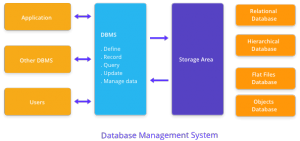
Best companies for database management
A database is an organized collection of data, generally stored and accessed electronically from a computer system. In case if the databases are more complex, then they are developed using formal design and modeling techniques.
Why is database so important?
The database management system (DBMS) is a software that interacts with end users, applications, and the database itself to capture and analyze the data. The DBMS software additionally encompasses the core facilities provided to administer the database. The sum total of the database, the DBMS and the associated applications can be referred to as a “database system”.

Types of Database
- Document databases
- Relational databases
- Graph databases
- Hierarchical databases
- Network databases
- Object-oriented databases
- ER model databases Document databases.
But our focus as of now remains on the different types of databases extensively used by enterprises small or large.
Document Database
Document databases are also known as NoSQL Database and, the store data in form of documents..
This database is known for its NoSQL data storage and provides faster mechanisms to store and search documents. Some of the popular databases under this category are Hadoop/Hbase, Cassandra, Hypertable, MapR, Hortonworks, Cloudera, Amazon SimpleDB, Apache Flink, IBM Informix, Elastic, MongoDB, and Azure DocumentDB.
Advantages of Document Databases:
- The indexing features are strong which helps in rapidly executing various queries.
- Since the documents are independent, which helps in enhancing the performance and
distribution across different servers a lot easier. - The unstructured data storage is easy
- The logic of application is much easier to write and, can be directly converted into
documents
Relational Database
Relational databases are the most popular and widely used databases. Some of the popular DDBMS are Oracle, SQL Server, MySQL, SQLite, and IBM DB2.
Advantages of Relational Databases:
- Relational databases provide excellent security. They support access permissions which allow the database administrator to implement need-based permissions to the access of data in database tables.
- This database supports relational algebra, which in turn supports the relational operations of set theory. Apart from the mathematical operations, they also support divisional operations.
- Relational databases use SQL, which is an easy and human-readable language.
Graph Database
Graph Databases are basically NoSQL databases and, they use a graph structure for clearly understanding sematic queries. The data is stored in form of nodes, edges, and properties. In a graph database, a Node represents an entity or instance, which could be a customer, person, or an object for that matter.
Properties are additional information added to the nodes. The Neo4j, Azure Cosmos DB, SAP HANA, Sparksee, Oracle Spatial and Graph, OrientDB, ArrangoDB, and MarkLogic are some of the popular graph databases.

Advantages of Graph Databases:
- They are perceived to be an excellent solution for real – time data analytical queries.
- These databases can work amazingly real – time updates on big data, along with supporting queries at the same time.
- This type of database gives you a flexible online schema evolvement while it serves your query.
- Graph models are more flexible for grouping and aggregating relevant data.
- They are excellent providers of AI infrastructure and, due to well – structured relational information between entities which allows one to further conclude facts & knowledge.
Knowing that these databases are very crucial and, also with changing times, the databases are enhancing every bit of these technology in this competitive era.
Do drop us a query to info@mobinius.com and, we shall be happy to help you.